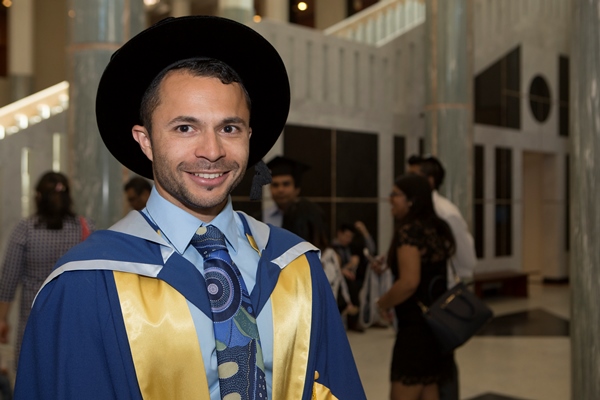Marcus Butler
8 October 2015: A world first study of social networks has made important links between friendships and smoking among Aboriginal and Torres Strait Islander people and earned the University of Canberra’s Raglan Maddox his PhD.
Dr Maddox said he’s interested in improving health outcomes for indigenous peoples globally, including reducing the life expectancy gap between Aboriginal and Torres Strait Islander people and the non-indigenous population.
“Aboriginal and Torres Strait Islander people are twice as likely as non-Indigenous people to smoke and tobacco use is responsible for one in five Aboriginal and Torres Strait Islander deaths. These deaths are completely preventable,” he said.
Tracing his family back to Milne Bay of Papua New Guinea, but growing up in Queanbeyan, Dr Maddox commenced his PhD at the University of Canberra in 2012.
“My research, the Smoke Ring Study, was the first mixed-method longitudinal study into social connections and how they impact smoking among Aboriginal and Torres Strait Islander people.”
“This study demonstrated the importance of education, and that achieving a year 12 level of education was protective against smoking,” Dr Maddox said.
“It also showed that relationships strongly influenced smoking behaviours, having a best friend who smoked was strongly associated with whether a person was a smoker, and a non-smoking best friend was linked to a person not smoking.”
University of Canberra Chancellor and National Coordinator Tackling Indigenous Smoking Professor Tom Calma AO has highly commended Dr Maddox for his research, which has provided significant insights into the smoking influencers for Aboriginal and Torres Strait Islander people.
“Having followed Dr Maddox’s research since its inception has meant that current national and local policies to address Indigenous smoking cessation have already been influenced by Dr Maddox’s findings,” Professor Calma said.
He puts his inspiration to study health down to his family.
“My mother is the youngest daughter of nine siblings, and at just 61 years old, mum and her younger brother are the only two of those nine that are left. As a result, I have a strong set of social justice principles at heart and would like to see better health outcomes and life expectancy for all.
Dr Maddox said his time at the University of Canberra involved a lot of hard work, but was very rewarding.
“Undertaking research has meant I have been able to find a good balance between being in the classroom, the office, health services and out in the community.
He counts being able to share his experience at some of the world’s leading institutions among his highlights, including presenting the Sir Richard Doll Seminar Series at Oxford, along with other presentations he made at Harvard, Johns Hopkins and the University of California Berkley.
Dr Maddox also says there are the small, but significant effects of his work in Canberra which he’s proud of as well.
“I was recognised by a community member at my local shops, she came over to tell me that she had cut down from a pack of cigarettes a day, to two cigarettes a day since completing our community survey.”
“My research findings demonstrated that there is a need to focus Aboriginal and Torres Strait Islander policy and more work is required to address the high rates of tobacco use.”
“But, if my research assists to provide better programs and services for communities to reduce tobacco use, preventing unnecessary deaths, then it’s been more than worthwhile,” Dr Maddox said.
Currently working in Toronto, Canada, Dr Maddox is undertaking a postdoctoral fellowship at the Well Living House - Centre of Research on Inner City Health, where he focuses on improving health and social services among the Aboriginal community in Toronto.



